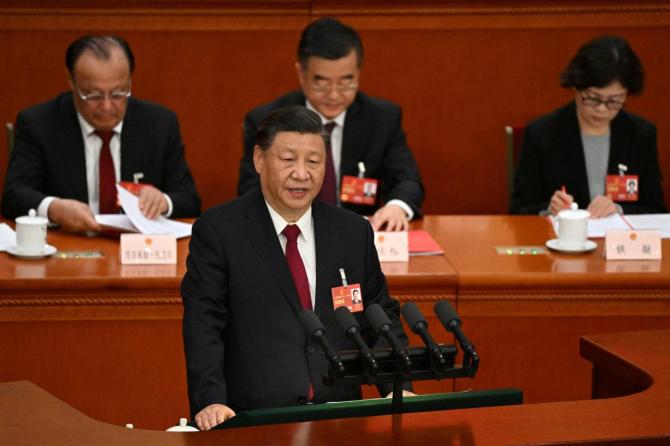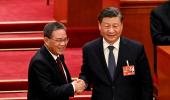President Xi Jinping on Monday vowed to build China's military into a "Great Wall of steel" to protect its sovereignty and developmental interests as he sought a bigger role for Beijing in global affairs, days after brokering a Saudi Arabia-Iran detente, regarded as a diplomatic coup.

Speaking for the first time since the rubber-stamp parliament last week approved his precedent-breaking third term as head of state, Xi called on the nation to uphold the leadership of the ruling Communist Party of China (CPC) headed by him.
"This is my third time assuming the lofty office of president," Xi, 69, said at the closing ceremony of China's national legislature, adding that "the trust of the people is the biggest driving force for me to move forward, and it is also a heavy responsibility on my shoulders.”
He pledged that he would "faithfully perform the duties entrusted by the constitution" and would "never let down the great trust" of all Chinese people.
"Security is the bedrock of development, while stability is a prerequisite for prosperity," Xi said
Xi also called for efforts to advance the modernisation of China's defence forces and build the people's armed forces into a "Great Wall of steel" that is capable of effectively safeguarding national sovereignty, security and development interests.
Xi's reference to the Great Wall was significant as the mammoth structure, with a total length of more than 20,000 km, was built over centuries by China's emperors to protect their territory. It also came amidst growing tensions between China and the US and some neighbouring countries.
Xi is regarded as the ’core leader' of the party very much like the party founder Mao Zedong.
He was endorsed by the rubber-stamp Parliament last week as the president and head of the Central Military Commission (CMC), the high command of the Chinese military, marking the beginning of his new five-year term.
He was elected as the head of the CPC for an unprecedented third term in October last year, the only leader to have more than two five-year terms after Mao. He was the only leader to have a third five-year term while all his predecessors retired after two five-year terms.
In his speech at the NPC closing ceremony attended by about 3,000 legislators, Xi said China will play an active part in the reform and development of the global governance system to advance the implementation of his initiatives the Global Development Initiative (GDI) and the Global Security Initiative (GSI) which aims to expand Beijing's diplomatic role in the world.
His comments came in the backdrop of China clinching a Saudi-Iran deal, regarded as a diplomatic coup, to end their years of hostilities and restore diplomatic ties.
Also speculation is rife that Xi is planning a visit to Russia next week to meet President Vladimir Putin to discuss a negotiated settlement to end the Ukraine war.
Russia's State-run Tass news agency quoted Kremlin Spokesman Dmitry Peskov as saying that "as a rule, announcements of official foreign visits are made synchronously, by mutual agreement".
As announced by earlier by China, Saudi Arabia and Iran on last Friday reached a deal that includes the agreement to resume diplomatic relations and reopen embassies and missions within two months.
The deal reached after talks in Beijing from March 6 to 10 was regarded as a major achievement for China in expanding its global outreach and countering the US influence, especially in the Middle East.
Last week, in unusually direct remarks, Xi accused the US of leading Western countries to "contain and suppress" China and bring it "unprecedented severe challenges."
A key agenda for the legislative session is to provide a strategy to cut reliance on the US. As part of that plan, the central government proposed to raise R& D spending by 2 per cent in 2023 to 328 billion yuan (USD 47 billion).
Also on March 5, China hiked its defence budget for the 8th consecutive year with a 7.2 per cent increase to USD 225 billion.
On Taiwan, which China claims is part of it, Xi said China is actively promoting the peaceful development of cross-Strait relations, resolutely opposing external interference and "Taiwan independence" separatist activities, and firmly advancing the process of national reunification.
He also promised to continue the one-country two system formula to develop Hong Kong despite the crackdown to subdue pro-independence forces in the former British colony under China's new security law.
Stressing that China will make concrete efforts to advance high-standard opening up, Xi said the country will not only leverage global markets and resources for its own development but also promote the development of the whole world.
He also called for building China into a great modern socialist country and advancing national rejuvenation.
From this day forward to the mid-21st century, the central task of the entire CPC, and all Chinese people will be to build China into a great modern socialist country in all respects and to advance the rejuvenation of the Chinese nation on all fronts, Xi said.
"The relay baton of building a great modern socialist country and advancing national rejuvenation has been historically passed on to our generation," he said.










